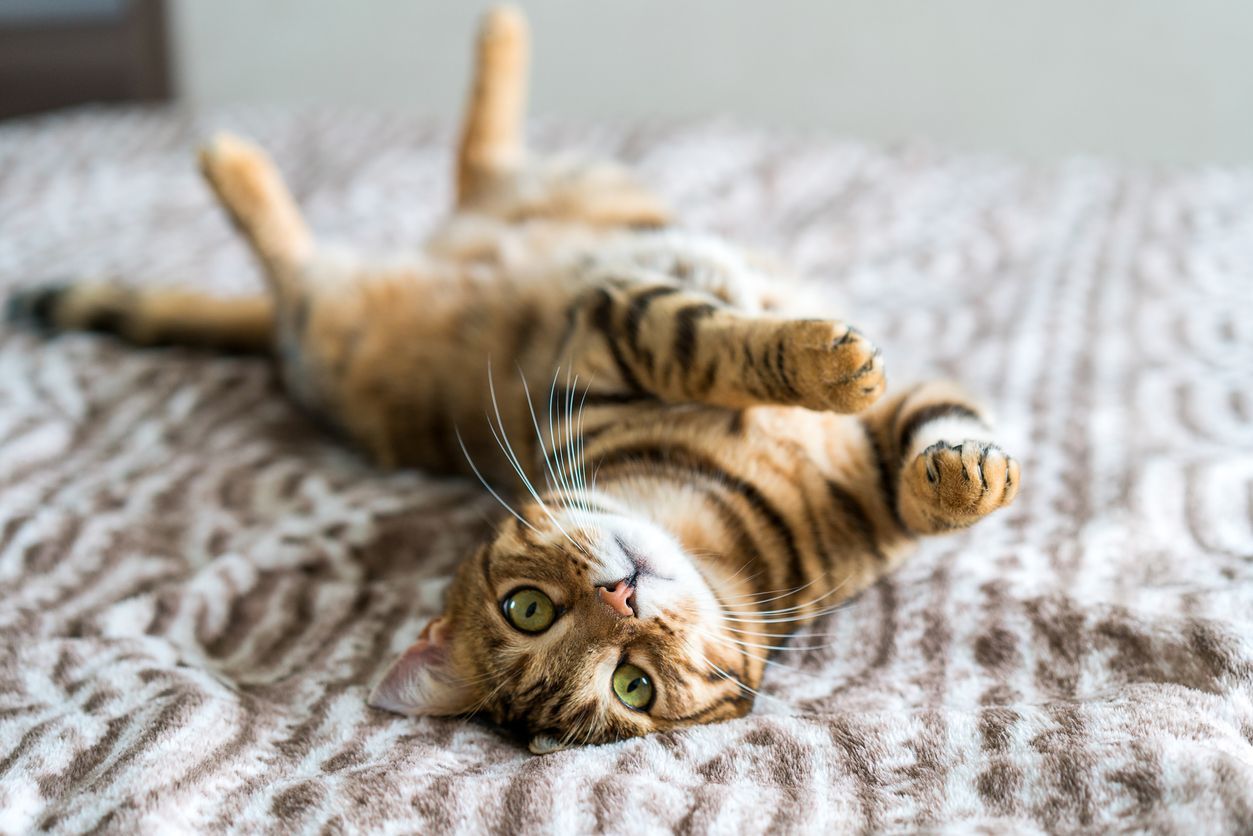Why you should spay or neuter your cat

Sexual alteration, also known as spay or neuter surgeries, are the most common surgical procedures performed on pet cats. However, many cat owners have questions about sterilization surgeries. Read on if you have ever asked:
- Why is it important to spay or neuter cats?
- What is the best age to alter my cat?
- How much does it cost to spay or neuter my cat?
- Are there risks to spay and neuter surgeries on cats?
- Will spay or neuter surgery change my cat’s behavior?
Sterilization surgeries protect your cat from many illnesses and medical conditions. In addition, sexual alteration helps curb unwanted behaviors and protect your neighborhood from overpopulation of domestic animals. Spaying or neutering is an important part of keeping your cat healthy.
Why is it important to spay or neuter cats?
Spay and neuter surgeries protect cats not only from unwanted pregnancies but also from a multitude of other illnesses and medical conditions that can be life-threatening. Some of the health concerns spay and neuter surgeries can protect your cat from include:
- Pyometra and uterine infections
- Uterine cancer
- Mammary cancer
- Testicular cancer
- Complications associated with pregnancy, delivery, and nursing
- Persistent heat
- Unwanted hormone-driven behaviors
- Shortened lifespan
Studies show that altered cats live 39% to 62% longer than intact cats. A spay or neuter surgery can dramatically decrease or eliminate the chance of a cat developing certain cancers and conditions associated with the reproductive system and sex hormones, providing a healthier life and increased life expectancy. In addition, behaviors associated with reproduction like roaming and fighting subside after surgical sterilization, so altered cats are less likely to come into contact with wildlife or be hit by cars. Cats can reproduce rapidly and at a young age, putting unaltered female cats at risk for pregnancy complications, such as the inability to deliver kittens and internal injuries.
What is the difference between spay and neuter surgeries?
The term neuter refers to any surgery that removes the gonads of animals. In North America, a spay usually involves removal of the uterus and ovaries. In Europe and the UK, typically only the ovaries are removed. The technical term for neutering a male cat is castration, as the testicles are removed.
What is the best age to spay or neuter a cat?
Cats are often altered at a younger age than dogs. Cats reach sexual maturity and can breed sooner than dogs and are more likely to be allowed to roam outdoors without supervision. In addition, there is no evidence at this time that neutering cats at a young age affects their health or development.
Cats can become pregnant as early as four months of age. Combined with the increased risk of cancers once cats reach sexual maturity, the Veterinary Task Force on Feline Sterilization has stated that cats should be altered before the age of five months old. Cats can be altered much earlier than five months of age, however. Kittens in shelters are typically altered by the age of eight weeks when they can be adopted. This prevents unwanted litters in shelters, cancer, and other medical conditions associated with the reproductive system, as well as assists new kitten owners.
Why are cats so overpopulated?
“Pet cats are more likely to be allowed to live outdoors, or a combination of indoors and outdoors, in comparison to dogs,” states Vetster veterinarian Dr. Jo Myers. “Combined with the ability to breed at a young age, a short gestation period, and large litters, cats can populate an area quickly.” Stray and feral cats can also reproduce with outdoor pet cats. Trap-neuter-release programs (TNRP) do exist for feral cat colonies, but pet cats need to be altered as well to decrease cat overpopulation.
What are the consequences of cat overpopulation?
Kitten season occurs every year during the warmer months when kittens seem to be more prevalent. Though having kittens around the neighborhood sounds fun, it can cause harm later down the road. Shelters frequently have cats coming in faster than they can adopt them out, often increasing rates of euthanasia in shelters at this time of year. In addition, large populations of outdoor cats create environmental concerns. Cats enjoy hunting, even if they are well-fed at home. This has been reported to contribute to a leading cause of extinction for multiple species of birds, small mammals, and reptiles in the wild. Keeping cats neutered helps curb cat overpopulation and overhunting of wild animals, as well as keeps your cat healthy.
Is spaying or neutering your cat expensive?
Any surgical procedure that requires general anesthesia can be expensive. Neuters are typically cheaper than spays because they are a shorter, less invasive procedure. Many veterinary practices have new kitten packages that discount vaccines and sterilization surgery for their clients. In addition, there are low-cost or free spay and neuter services in many areas. Check at your local humane society, animal shelter, or low-cost veterinary clinic. Some locations even have mobile spay and neuter clinics that offer affordable sterilization surgeries for dogs and cats.
What are the risks of spay and neuter surgeries?
Every surgery and procedure with anesthesia has risks, but steps are taken to minimize them. Spay and neuter surgeries are the most common procedure performed on dogs and cats around the world. Having a thorough physical examination to determine if your cat is healthy enough for surgery and anesthesia helps reduce the risks. Bloodwork or other diagnostic tests like X-rays or an ECG may be recommended to assess the animal’s current state of health as well. Extensive monitoring of vital signs and the use of IV fluids also help decrease the risks. Pain management helps ease recovery and can speed healing. Always follow your vet’s instructions and keep your cat indoors until they have fully healed from surgery.
Will my cat change after getting spayed or neutered?
After recovering from sexual alteration surgery, your cat’s overall temperament will stay the same or even improve. Though sterilization surgeries do not affect personality, they can curb unwanted behaviors associated with sex hormones, such as some aggressive behaviors, territorial urine marking, excessive roaming, and heat-related behaviors. Spaying or neutering your cat does not directly cause weight gain or obesity. Altering a cat can affect its metabolism, so a change in diet or the number of calories your cat needs per day may need to change once they are altered. Always talk with a veterinarian before changing your cat’s diet.
Should I neuter my cat?
Altering your cat will protect them from many kinds of cancers and life-threatening conditions, such as pyometra. Studies have shown that sterilization can dramatically increase the quality and longevity of your cat’s life. In addition, it will prevent unwanted litters of kittens and the medical risks that come with pregnancy. Finally, neutering can curb some unwanted behaviors that are associated with reproductive hormones. There is no evidence that spaying or neutering a cat older than eight weeks of age has a negative effect on its long-term health. If you have questions about a spay or neuter surgery for your cat and how it may be affected, you can connect with an online vet to discuss your concerns and make the best choice for your pet.
FAQ - Why you should spay or neuter your cat
At what age should a cat be spayed or neutered?
The Veterinary Task Force on Feline Sterilization recommends that cats should be spayed or neutered before the age of five months. Cats can breed as early as four months of age and their risk of developing certain cancers increases when they reach sexual maturity. Due to this, many shelters will alter cats at the age of eight weeks old.
Is sterilization good for cats?
Sterilization eliminates the chances of cats developing certain cancers and reduces the possibility for other life-threatening conditions, such as pyometra and complications of pregnancy. Spay and neuter surgeries have been shown to increase the life expectancy of pet cats and improve their life long-term.
How long does it take for a cat to recover after a spay or neuter surgery?
Many cats will begin to feel better within a couple of days, especially with the help of pain management. It is important to follow your veterinarian’s instructions to prevent complications, even if your cat is feeling better. It can take a couple of weeks before a cat is fully healed after a spay or neuter surgery.










